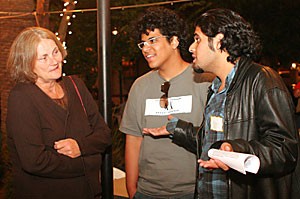The Kingdom of Saudi Arabia has recently decided to allow nearly 5,000 undergraduate students to study in the United States this year, with more than 100 Saudi students coming to the UA.
The Kingdom of Saudi Arabia recently made changes to the country’s higher education study abroad policy, and students will now be allowed to study in the U.S., said Alfred Stover, assistant director for Outreach and Development at the UA Center for English as a Second Language.
More than 30 new Saudi Arabian students were welcomed to the UA last night during an event held at Sinbad’s Restaurant, 810 E. University Blvd., by representatives from the Office of International Student Affairs and the Center for English as a Second Language.
“”Last April, Crown Prince Abdullah and President George Bush agreed that more students should come (to the U.S.) to study,”” Stover said. “”A few months after that, Abdullah became king and the new policy was enacted.””
The scholarship program fully provides students with financial support by the Saudi government for education, housing and other miscellaneous expenses, said Stover and Helen Abdulaziz, assistant director for student services.
In addition to education, another important reason for Saudi students to study abroad in the U.S. is to help break stereotypes of both Americans and Saudis, Abdulaziz said.
“”I think it is important to remember that this scholarship program came about at the highest levels of both governments,”” Stover said to the audience. “”This program is going to not only educate the best and the brightest, it’s also going to go a long way to helping international understanding.””
Until the recent changes, Saudi undergraduate students were primarily educated in Saudi Arabia with only a small number of students allowed opportunities to study abroad, said Sultan Sultan, a Saudi CESL student who plans to study engineering at the UA.
“”Everything here is organized and planned for,”” said Mohammad Mujallad, a Saudi CESL student who plans to pursue a pharmacy major. “”The appointments, everything for classes and for the culture, it is really entirely different than Saudi Arabia.””
Mujallad said despite being granted the scholarships and financial grants, obtaining a U.S. Visa was one of the hardest steps to studying in the U.S.
The students who were welcomed last night will be required to study English at the Center for English as a Second Language, 1100 E. James E. Rogers Way, until they can pass a proficiency exam and begin major studies at the UA, Stover said.
“”I chose the UA because it is one of the best engineering (schools) and is well known,”” said Abdulsalam Alidriss, a Saudi CESL student who plans to study mechanical engineering. “”(In Saudi Arabia) if you have a degree from the University of Arizona you can find a better job and a good income.””
Student selections for the Saudi Arabian study abroad program are based on academic qualifications and other qualifications known only by the Saudi government, Stover said.
Most of the students have an emphasis on engineering or business.
“”I think the UA is one of the best universities,”” Sultan said. “”I came here to get my certificates, and I’m not going to go back without it.””









